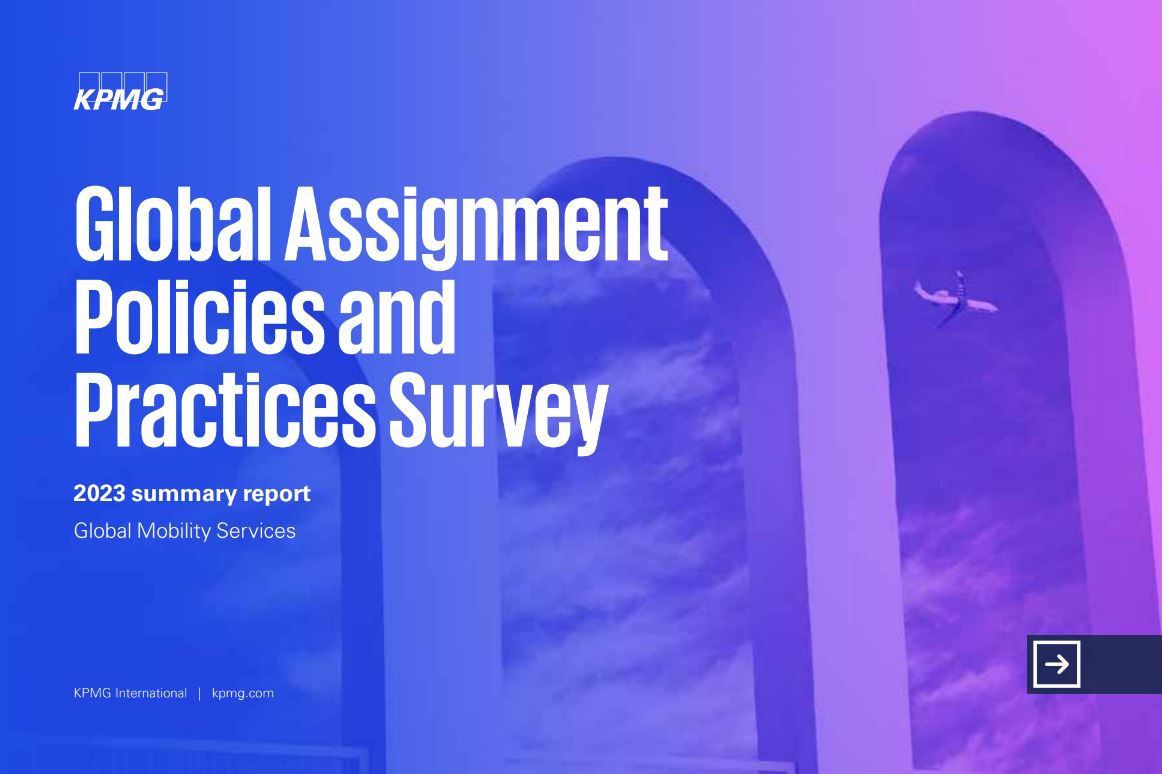For global mobility leaders of multinational organizations, benchmarking your global mobility policies and practices against those of other global organizations and industry peers can be a powerful tool for reflecting on your current approach and planning how to prepare your talent mobility program for the future. To help, KPMG International conducts this annual survey of global mobility policies and practices of multinational organizations. While the number of participants continues to grow, the resulting database is already believed to be one of the most robust of its kind on a global scale.
The data offers insights into global mobility programs and how they are evolving in terms of mobility, tax and immigration policies, structure, governance, priorities, performance measures, technology, robotics, automation, international remote working and more
Download the 2023 KPMG Global Assignment Policies and Practices Survey summary report and scroll down for more on this year's key findings.

2023 KPMG Global Assignment Policies and Practices Survey
A look into how global mobility programs are evolving based on the survey results from over 100 multinational organizations in jurisdictions worldwide.
Download PDF (888 KB) ⤓
What do the latest results tell us?
The results of this year’s Global Assignment Policies and Practices (GAPP) Survey sheds light on how global mobility programs are continually evolving. In addition to compliance and global risk management, supporting the organization’s business objectives, controlling program costs and being adaptable to changing business requirements are clearly the top priorities for today’s global mobility leaders. The global talent mobility function’s contribution to strategic value for the organization has taken priority; being recognized as a trusted advisor and collaborator to the business.
Many organizations are recalibrating their approach to flexible work arrangements, leaning towards requiring employees to be more present in the office. This shift represents a response to several factors, including the desire for more direct collaboration, and the cultivation of company culture.
Businesses, however, must recognize that top professionals now prioritize flexibility and work-life balance. To remain competitive, organizations will need to blend the advantages of in-person collaboration with a continued commitment to accommodating the diverse needs and preferences of their workforce, all while striving to attract and retain the best talent in this ever-evolving employment environment.
Recognizing the importance of attracting, retaining, and developing top talent as a competitive advantage, the global mobility function plays a pivotal role in making this vision a reality.
This alignment helps ensure the right people are in the right place at the right time, with the skills and expertise to drive the organization forward. By harmonizing global mobility with talent initiatives, companies can leverage international experience, facilitate career growth, and support the evolving needs of their workforce, ultimately contributing to sustained success and an agile response to the ever-changing demands of the global marketplace.
Global mobility functions continue to place a strong emphasis on technology due to its transformative impact on the way organizations manage their global workforce. In terms of global mobility, technology serves as an enabler, allowing companies to optimize the deployment of their talent on a global scale.
By leveraging technology, global mobility functions can not only improve efficiency and cost-effectiveness but also enhance the overall employee experience, making it an indispensable tool for organizations seeking to navigate the complexities of global talent management while remaining agile, competitive, and compliant in the dynamic global landscape.
There has been a notable increase in the incorporation of inclusive language and a heightened awareness of accessibility concerns within mobility policy development.
As organizations strive for greater diversity and inclusivity, it has become essential to ensure mobility policies address the unique needs of all employees.
This shift underscores a commitment to providing equitable opportunities for all, irrespective of individual circumstances or identities.
Organizations are recognizing that mobility policies must be accessible, accommodating, and free from bias, thereby fostering a more inclusive work environment.
There continues to be an ongoing trend of short-term cross-border mobility by companies.
Short-term assignments, often lasting weeks or a few months, provide companies with a flexible solution to address specific projects, knowledge transfers, or market exploration without the long-term commitment of traditional expatriate assignments.
This trend aligns with the evolving preferences of a mobile and diverse workforce, and as companies continue to prioritize agility and adaptability, short-term cross-border mobility is likely to remain a prominent feature of talent management strategy.
Benchmark your organization today!
We are excited to announce the next evolution of the industry leading Global Assignment Policies and Practices (GAPP) Survey. In response to client feedback, the new survey — now known as the KPMG Global Mobility Benchmarking Survey — has gone through a wholesale update to have a broader focus across programs and policies; talent management; service delivery; and technology; while undergoing a 50% reduction in length.
Your participation in the survey will allow you to benchmark your organization in relation to other survey participants and provide you with valuable trends and meaningful insights into mobility programs and policies, approaches to talent management, operating models and the use of technology and data.
If you would like to participate in the KPMG Global Mobility Benchmarking Survey, please click here. To learn more about how KPMG’s Mobility Consulting Services can help you build an operating model that serves and delivers for your organization, please send an email to tax@kpmg.com.
Related content
Connect with us
Thalia O'Toole
Tax Principal & Head of Global Mobility
KPMG in Ireland



